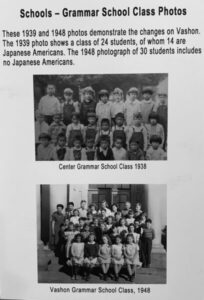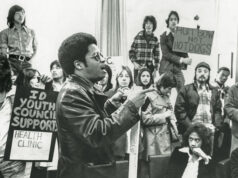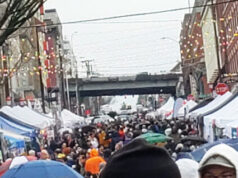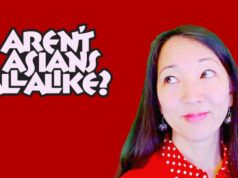By Leah Okamoto Mann
The North American Post Contributor
 On February 19, 1942, Executive Order 9066 was signed by U.S. President Franklin D. Roosevelt. This authorized 127,000 people of Japanese descent, 80,000 of whom were American citizens, to be forcibly removed from their homes and relocated to internment camps in California, Arizona, Wyoming, Colorado, Utah and Arkansas for up to four years. On Vashon, 111 residents were exiled.
On February 19, 1942, Executive Order 9066 was signed by U.S. President Franklin D. Roosevelt. This authorized 127,000 people of Japanese descent, 80,000 of whom were American citizens, to be forcibly removed from their homes and relocated to internment camps in California, Arizona, Wyoming, Colorado, Utah and Arkansas for up to four years. On Vashon, 111 residents were exiled.
These photos of a grammar school on Vashon before and after WWII show the stark effect incarceration had on the island.▶︎
In 2022, President Joe Biden issued a presidential proclamation declaring February 19 as the National Day of Remembrance for the Japanese American incarceration during World War II. In commemoration, Mukai Farm & Garden hosted an open house from 1-4pm with self-guided tours of the 1926 built farmstead. It houses an exhibit covering the 120+ years of Japanese presence on Vashon, including the impact of the forced removals.
Following the open house, there was a panel presentation with Dr. Jade Agua and Dr. Joseph Okimoto. Okimoto is a former Friends of Mukai Board of Directors member and retired psychiatrist with Asian Counseling and Referral Services in Seattle. He is the son of immigrant parents who came to America from Japan in 1937. He and his family were incarcerated in 1942 at the Poston, Arizona, concentration camp for three and a half years as a result of Executive Order 9066. Agua is Friends of Mukai Board of Directors vice president and a chief learning officer at the University of Southern California Race and Equity Center.
As part of the evening, a film of Dartmouth College’s “Conversations That Matter” featuring Dr. Okimoto was shown. He discussed Executive Order 9066 and shared his personal experience of incarceration. The conversation took place at Dartmouth’s University’s Geisel School of Medicine on the nation’s President’s Day, which was also ironically the National Day of Remembrance.
Theodor Geisel is more popularly recognized as Dr. Seuss. Geisel drew cartoons that were harshly anti-Japanese and anti-Japanese American, using offensive stereotypes to caricature them. Both Geisel and Okimoto are graduates of Dartmouth, which houses the Geisel School of Medicine. This complicated history was a part of the conversation at Mukai Farms.
Agua mapped the throughlines of individual to institutional othering and oppression, the role of media narratives that can lead to violence, and how racism interlocks with systems of oppression. Her slide presentation included some of Geisel’s propaganda cartoons, which were part of the substantiation campaign for the institutional incarceration of so many Americans of Japanese descent.
Agua also presented recent anti-Asian and anti-immigrant narratives such as the so-called “Wuhan Virus and Chinese Virus,” which led to an uptick in anti-Asian hate crimes in the U.S. in 2020. The conversation referenced the treatment of asylum seekers at our borders and in our current “detention” centers as well as the treatment of Palestinians in Gaza, Israel.
One audience member asked about the long-term impacts on Vashon. There is a picture of a class at Vashon Public School in 1938 and then in 1948.
It has taken 81 years for the percentage of non-white identifying students to recover to even 26% within the island’s school system, with only 13.5% identifying as Asian and Pacific Islander.
Mukai was honored to host the event on this occasion of remembrance as an educational offering to inspire and nurture a more inclusive community. As Noam Chomsky wrote, “Education is not memorizing that Hitler killed six million Jews. Education is understanding how millions of ordinary Germans were convinced it was required. Education is learning how to spot the signs of history repeating itself.”
May we remember.






